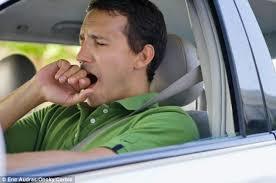
- The best countermeasure to drowsy driving is to get enough rest on a daily basis. Sleep is the only true preventative measure against the risks of drowsy driving. Make it a priority to get 7-8 hours of sleep per night. For more information on healthy sleep, see the National Heart, Lung, and Blood Institute website.
- Before the start of a long family car trip, get a good night’s sleep, or you could put your entire family and others at risk.
- Many teens do not get enough sleep at the same time that their biological need for sleep increases, thereby increasing the risk of drowsy-driving crashes, especially on longer trips.
- Avoid drinking any alcohol before driving. Consumption of alcohol interacts with sleepiness to increase drowsiness and impairment.
- If you take medications that could cause drowsiness as a side effect, use public transportation when possible. If you drive, avoid driving during the peak sleepiness periods (midnight – 6 a.m. and late afternoon).
- If you must drive during the peak sleepiness periods, stay vigilant for signs of drowsiness, such as crossing over roadway lines or hitting a rumble strip, especially if you’re driving alone.
SHORT-TERM INTERVENTIONS
- Drinking coffee or energy drinks alone is not always enough. They might help you feel more alert. However, the effects last only a short time, and you might not be as alert as you think you are. If you drink coffee and are seriously sleep-deprived, you still may have “micro sleeps” or brief losses of consciousness that can last for four or five seconds. This means that at 55 miles per hour, you’ve traveled more than 100 yards down the road while asleep. That’s plenty of time to cause a crash.
- If you start to get sleepy while you’re driving, drink 1-2 cups of coffee and pull over for a short 20-minute nap in a safe place, such as a lighted designated rest stop. This has been shown to increase alertness in scientific studies but only for short time periods.
Sources:
https://www.nhtsa.gov/risky-dr...
